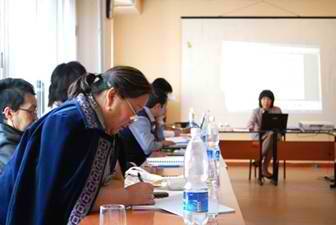In a two-day training on aid effectiveness organized by the Forum of Women’s NGOs of Kyrgyzstan, CSO participants called on government and donor representatives present during the event for their participation in aid monitoring and in national planning of priorities and strategies through a mechanism for multi-stakeholder dialogues.
CSOs from all provinces in Kyrgyzstan participated. The Forum of Women’s NGOs of Kyrgyzstan prepared and translated a big reading material package of various related documents and CSOs’ positions on aid effectiveness such as IBON’s Primer on ODA and Aid Effectiveness.
Paris Declaration and the Accra Agenda for Action were discussed in depth by the participants.
CSO participants referred to specific clauses in the Paris Declaration and the Accra Agenda for Action, which encourage governments and donors to deepen their engagement with CSOs as independent development actors. According to the CSO participants, no such mechanisms for deeper engagement with CSOs exist in Kyrgyzstan and thus, the needs and demands of the poor and marginalized are not taken into consideration in drafting national priorities and strategies.
During the training, Mr Kuvat Murzaev, Head of the Department on Investment of the Ministry of Economic Regulation said that the government does not have funds to finance projects on CSOs’ capacity development. When CSOs asked about transparency, he said that information is made public through the media, acknowledging however that people especially from the far regions can’t access information.
The European Union, represented by Taru Kernisalo, Attache and Project Manager and Tom Macy, head of Operation in the EU Commission in Kyrgyzstan, said that it “coordinates its aid in an active manner with donors and government of Kyrgyzstan”. Currently, there are 22 donor agencies in the country and understanding the importance of coordinating aid, the Donor Coordination Council was created in 2004. EU is one of the nine development partners of the Kyrgyzstan government in its Joint Country Support Strategy (JCSS) , along with Germany, ADB, Swiss Development Cooperation, UK Department for International Development, UN, WB and the International Management Bank.
In monitoring its aid, EU employs different approaches although there is no regular monitoring system with CSOs.
CSO participants also raised the issue of EU-funded projects contributing to ethnical conflicts in areas like Osh. The EU representatives said that they are not aware of this and will investigate the matter and encouraged CSOs to formally bring this complaint to EU.
According to Tom Macy, EU will try to take to the donors the CSO proposal for a normal and regular mechanism for communication. EU has already discussed with Germany and the Kyrgyzstan government over wanting civil society involvement in the formulation of national priorities and strategies and create an enabling environment for CSOs in terms of effective legislation. “CSOs should have a proper place in this dialogue under the new Constitution,” he added.
Another issue raised was the competition between INGOs and local NGOs for funds. According to EU, they now work directly with local NGOs whereas they used to work with INGOs, now having different budget lines. Although there are certain things that INGOs can do, EU encourages the transfer of knowledge and skills and encourages partnerships.
 EU added that although CSOs don’t have a space in the Donor Coordination Council, there are specific meetings where CSOs can still participate. They are pleased to know that CSOs in Kyrgyzstan have started networking and sees this as one of the ways for them to work with donors more effectively.
EU added that although CSOs don’t have a space in the Donor Coordination Council, there are specific meetings where CSOs can still participate. They are pleased to know that CSOs in Kyrgyzstan have started networking and sees this as one of the ways for them to work with donors more effectively.
A question of enabling environment for CSOs was part of the training program and Nookat Indrisov, a local expert led discussion on factors such as law, taxation and funding schemes for CSOs.
The last part of the training focused on developing the capacity of CSOs to participate in and conduct their own monitoring of aid projects, PD and AAA implementation, by sharing their own methods of monitoring and discussing in detail the monitoring matrix on PD and AAA implementation developed by the Reality of Aid. Stressing the importance of effective engagement based on on-the-ground realities and data, the CSO participants agreed to create a monitoring group and monitoring plan on PD and AAA implementation in Kyrgyzstan in time for their dialogues with donors and governments.
The training “Basis of aid effectiveness and CSOs’ position on PD and AAA” was part of a series of activities on aid and development effectiveness in Kyrgyzstan. The training took off from a CSO meeting wherein a coalition of four large CSO national networks was created in September. CSOs will be preparing data for their dialogue with donors and governments in November; after which they will come up with concrete CSO recommendations, all leading up to a national multi-stakeholder dialogue in December 2010. The activities are implemented with assistance from the Reality of Aid Network.

